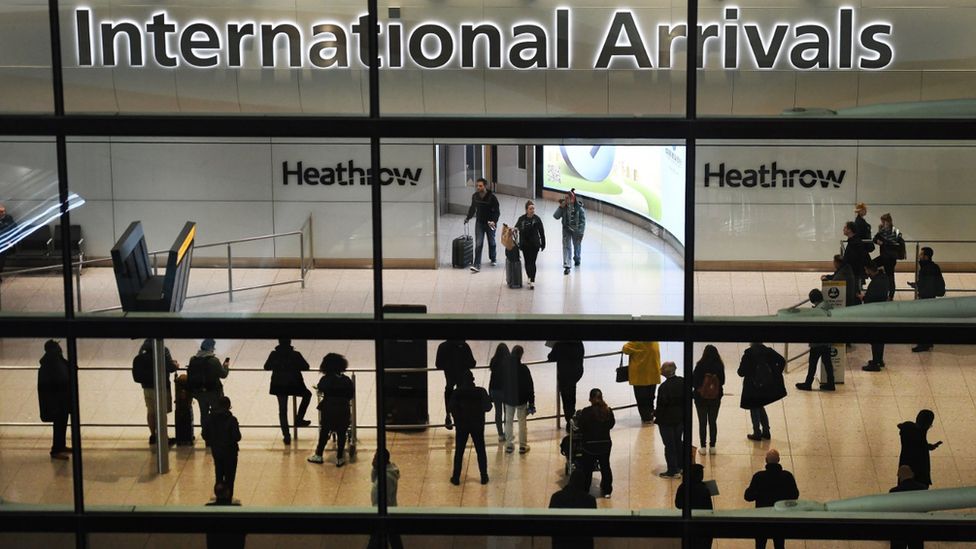
With travel restrictions lifted in 2021, more students arrived in the UK after studying remotely during the coronavirus pandemic
By Thomas Mackintosh
BBC News
UK net migration rose to a record 606,000 last year, the Office for National Statistics (ONS) has said.
Net migration is the difference between the number of people arriving in the UK, and the number leaving.
Factors include resettlement schemes for people leaving Ukraine and Hong Kong as well as overseas students.
It is considered a major setback for Prime Minister Rishi Sunak who has been under pressure to deliver a 2019 Tory manifesto pledge to cut net migration.
Appearing on ITV’s This Morning, Mr Sunak said the numbers were “too high” but denied they were out of control.
In 2022, an estimated 1.2 million people arrived in the UK, and 557,000 emigrated, the ONS said.
The 606,000 figure is an increase of 164,000 on 2021’s net migration total.
Most of those coming to the UK were non-EU nationals (925,000), followed by EU nationals (151,000) and British people (88,000).
Among them, 114,000 Ukrainians arrived in the UK last year, after Russia invaded last February.
And 52,000 Hong Kong citizens moved to the UK in 2022 on a special visa scheme created after China imposed a national security law in the former British colony, which made it easier for authorities to punish protesters.
The number of work-related arrivals from outside the EU nearly doubled compared with 2021 – 235,000 compared with 137,000 the year before.
The ONS pointed out that the latest figures reflect changes made during the pandemic in how official migration figures are calculated.
Projections are now linked more to government data rather than surveys of passengers arriving at British ports, and asylum seeker numbers are now included.
BBC Verifyestimates asylum seekers make up about 8% of immigration into the UK from outside the EU.
Last year, 76,000 people applied for asylum in the UK, 23,000 more than the previous year.
The number doesn’t include everybody who arrived in small boats, but the Home Office estimates about 90% of people who arrive that way go on to seek asylum.
Dr Peter Walsh, of Oxford University’s Migration Observatory, described the current period as “very unusual” and said the UK was a popular destination for foreign students and workers.
He told BBC Breakfast there have been initiatives from the government and universities to recruit more students, particularly from countries like India and Nigeria.
“They also last year brought around 100,000 partners and children,” Dr Walsh added.
“International students pay the high fees which subsidise the education of domestic students.”
For more than a decade successive Conservative-led governments have promised to cut migration – once targeting a net figure of less than 100,000.
Reacting to the fresh ONS figures, the Prime Minister told ITV: “Numbers are too high, it’s as simple as that. And I want to bring them down.”
Asked whether immigration was out of control, Mr Sunak replied: “Well, no, I think the numbers are just too high.”
The PM said measures put in place this week were “significant” and would bring levels down over time.
On Tuesday, the government announced it would tighten visa rules for overseas students to try to cut immigration.
From next year, only those on post-graduate research programmes will be able to bring their families to the UK.
Image source, PA Media
The war in Ukraine led to new humanitarian schemes
In the House of Commons, Labour’s shadow home secretary Yvette Cooper said support given to Ukrainians and Hong Kongers has “unusually affected the figures”.
“Net migration is more than twice the level ministers were aiming for, and the asylum backlog is at a record high despite Rishi Sunak promising to clear it this year,” she said.
Ms Cooper criticised the government for failing to tackle skills shortages, especially in health and social care, or to get people back into work after Covid.
Immigration minister Robert Jenrick said: “We want British employers to focus… on training British workers to fill these vacancies.”
He added that he worried high net migration was placing “intolerable pressure on public services, on housing supply and on our ability as a country to integrate new arrivals”.
“What we do want to see is universities focusing on teaching and not on inadvertently creating a backdoor to immigration status here,” he added.
On the backlog of asylum claims, Downing Street said the government was focused on reducing the number of people waiting and measures such as doubling the number of case workers would “take time to bed in”.








